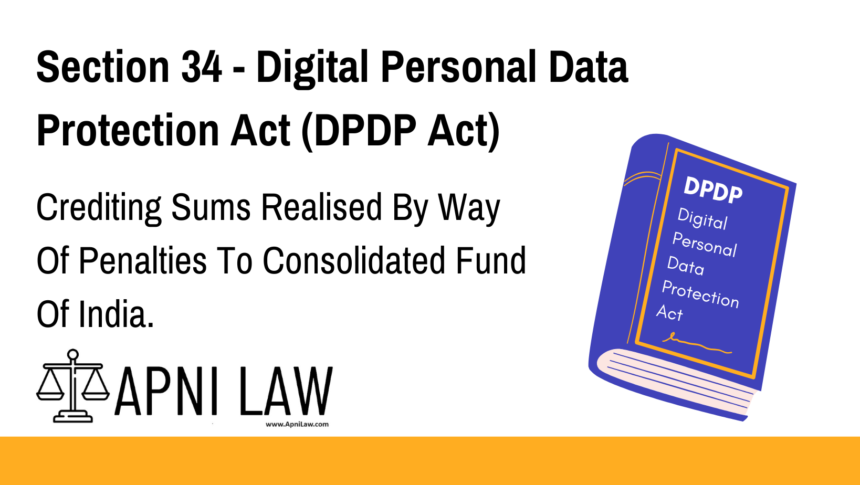Code: Section 34
All sums realised by way of penalties imposed by the Board under this Act, shall
be credited to the Consolidated Fund of India.
Explanation
Section 34 explains where the penalty money collected under the DPDP Act must go. Whenever the Data Protection Board imposes a fine, the money collected must be deposited into the Consolidated Fund of India.
The Consolidated Fund is the government’s main account. It handles most of the country’s public revenue. As a result, this provision ensures that penalty money is not kept by any agency or used for private purposes. Instead, the money becomes part of national resources.
This rule also supports transparency and proper public fund management. It guarantees that the Board does not benefit financially from issuing penalties.
Key Highlights
- All collected penalties go directly into the Consolidated Fund of India.
- The Board has no power to keep or spend this money.
- This system aligns with how public money is managed under Indian law.
Illustration
Example 1: Tech Company Fined
A technology firm faces a ₹10 crore fine after a major data breach. After collecting the penalty, the Board sends the full amount to the Consolidated Fund of India.
Example 2: Repeated Consent Violations
An app repeatedly misuses users’ personal data. The Board fines the company ₹2 crore. As per Section 34, the entire amount is credited to the national fund and not retained by the Board.
Common Questions and Answers
- What is the Consolidated Fund of India?
It is the government’s primary account. All revenue from taxes, loans, and penalties is deposited there. This fund supports all public expenses.
- Can the Data Protection Board use this money?
No. The Board must forward all penalties to the Consolidated Fund. It has no right to spend or control these funds.
- Why is this provision important?
This rule ensures that financial penalties serve the public and not the enforcing authority. It builds public trust and accountability.
- Is this approach common in Indian laws?
Yes. Several other laws, such as the Companies Act and Environmental laws, require penalties to be deposited into the Consolidated Fund.
- Does this apply to all penalties under the DPDP Act?
Absolutely. Section 34 covers all penalties imposed by the Board under this Act.
Conclusion
Section 34 of the DPDP Act helps maintain transparency in how financial penalties are handled. By sending all collected sums to the Consolidated Fund of India, the law protects against misuse of funds. It also ensures that the enforcement process remains neutral and accountable.
For a deeper understanding of the DPDP Act and your rights under Indian digital laws, explore more articles on ApniLaw.











